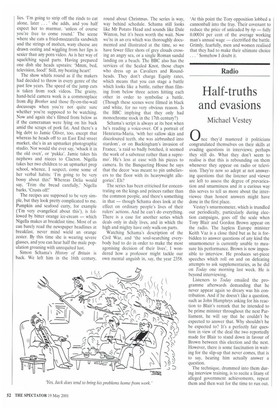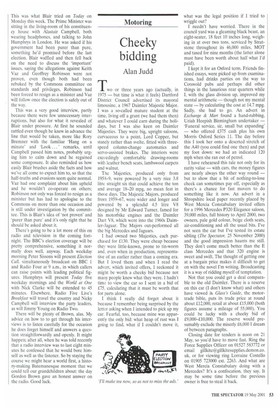Radio
Half-truths and evasions
Michael Vestey
Once they'd mastered it politicians congratulated themselves on their skills at evading questions in interviews; perhaps they still do. What they don't seem to realise is that this is rebounding on them whenever they appear on radio or television. They're now so adept at not answering questions that the listener and viewer are left to assess the degree of prevarication and smarminess and in a curious way this serves to tell us more about the interviewee than honest answers might have done in the first place.
Vestey's smarmometer, which is trundled out periodically, particularly during election campaigns, goes off the scale when Tony Blair and Gordon Brown appear on the radio. The hapless Europe minister Keith Vaz is a close third but as he is forbidden to answer questions of any kind the smarmometer is currently unable to measure his performance. Brown is now impossible to interview. He produces set-piece speeches which roll on and on defeating attempts to ask supplementaries, as he did on Today one morning last week. He is beyond interviewing.
Listeners to Today emailed the programme afterwards demanding that he never appear again so dreary was his contribution. And if he doesn't like a question, such as John Humphrys asking for his reaction to Blair's remark that he intended to be prime minister throughout the next Parliament, he will say that he couldn't be expected to answer that. Why shouldn't he be expected to? It's a perfectly fair question in view of the deal the two reportedly made for Blair to stand down in favour of Brown between this election and the next. However, there is some fascination in waiting for the slip-up that never comes, that is to say, hearing him actually answer a question.
The technique, drummed into them during interview training, is to recite a litany of alleged government achievements, repeat them and then wait for the time to run out. This was what Blair tried on Today on Monday this week. The Prime Minister was sitting in the living-room of his constituency house with Alastair Campbell, both wearing headphones, and talking to John Humphrys in London. He was asked if his government had been purer than pure, something he'd promised before the laSt election. Blair waffled and then fell back on the need to discuss the 'important' issues, saying the allegations against Keith Vaz and Geoffrey Robinson were not proven, even though both had been rebuked by the Commons comniittee on standards and privileges, Robinson had been forced to resign as a minister and Vaz will follow once the election is safely out of the way.
This was a very good interview, partly because there were few unnecessary interruptions, but also for what it revealed of Blair under pressure. At first he sounded rattled even though he knew in advance the line that would be taken, more like Rory Bremner with the familiar 'Hang on a minute' and 'Look.,.' remarks, until Campbell passed him notes, probably urging him to calm down and he regained some composure. It also reminded us how easily Blair brushes aside the facts and how we've all come to expect him to, so that the half-truths and evasions seem quite normal. Vaz had one complaint about him upheld and he wouldn't co-operate on others; Robinson not only was forced to resign as a minister but has had to apologise to the Commons on more than one occasion and is still under investigation by the committee. This is Blair's idea of 'not proven' and 'purer than pure' and it's only right that he should be asked about it.
There's going to be a lot more of this on radio and television in the coming fortnight. The BBC's election coverage will be pretty comprehensive, something it normally does well, anyway. Each weekday morning Peter Sissons will present Election Call, simultaneously broadcast on BBC 1 and Radio Four at 9 a.m., in which callers can raise points with leading political figures. Humphrys will present Today five weekday mornings and the World at One with Nick Clarke will be extended to 45 minutes. Elsewhere, Radio Five Live's Breakfast will travel the country and Nicky Campbell will interview the party leaders, as will Jimmy Young on Radio Two.
There will be plenty of Brown, alas. My advice on how to to get through his interviews is to listen carefully for the occasion he does forget himself and answers a question straightforwardly and openly. It might happen; after all, when he was told recently that a radio interview was to last eight minutes he confessed that he would bore himself as well as the listener. So by staying the course we might hear a world first, a history-making Batemanesque moment that we could tell our grandchildren about: the day Gordon Brown gave an honest answer on the radio. Good luck.



































































 Previous page
Previous page